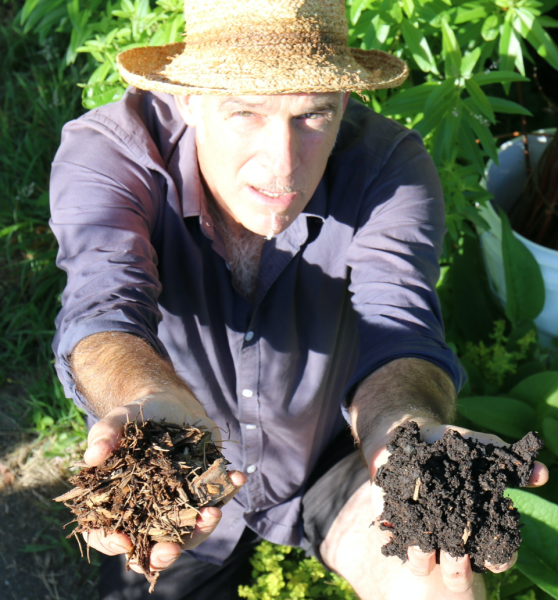There is no agreed definition of what compost actually is or isn’t, and a huge array of commercial products sold as ‘compost’ look more like ‘mulch’ to me. Some people use the terms ‘mulch’ and ‘compost’ interchangeably, but that could get very confusing if I say, “it’s a good idea to mulch your compost after spreading it on the garden”.
Let’s see if we can clear up our definitions and sort the compost from the mulch.
Mulch is a soil protector, its job is to sit on the soil surface, keeping the soil from drying out, either from the baking sun, or the dehydrating wind and as a trap for soil moisture. By this definition plastic sheet (like that used by strawberry farms) and gravel/stones can be considered a mulch.
Some prefer to include that mulch is organic (from living material). This would exclude plastics or rocks, but would include things like wood chips, straw from grain growing and autumn leaves. Organic mulches will have the added benefit of slowly decomposing and, potentially feeding the soil as they do.
This feeding, or soil improving, is a by-product of mulch’s role as a soil protector and not its primary function, and in some cases (like applying fresh wood chips or sawdust) they can actually strip nutrients from the soil, at least for a while.
Compost is harder to get a clear definition on, we know that it is made from the microbial decomposition of (mostly) organic materials, but that could describe an array of different substances, from the dusty stuff, broken down at the base of a wood chip pile, to the juiciest, worm-laden, dark chocolate, humic, black-gold you can imagine (can you tell which one I am more excited about?).
For me, the distinction lies in what you would feel comfortable doing with it. If it feels okay to have it sitting on the surface in the sun, just protecting the soil, then it is probably mulch. If, on the other hand, you want that ‘juicy, worm-laden, dark chocolate, humic, black-gold’ in direct contact with your soil, improving it and feeding the soil life, then it sounds like it has earned the name ‘compost’.
Some experts consider compost’s primary role as a ‘soil improver’ or ‘conditioner’ and believe that its function as a ‘fertiliser’ is secondary, or perhaps not even important. This might be true for lower quality composts, which may still have a role improving degraded soils.
In my experience good compost does it all, building soil structure, adding magnificent water and nutrient-holding qualities, contributing nutrients or ‘fertilising’ the soil as well as increasing beneficial life forms and their habitat that will also contribute to soil health.
I do think it’s a good idea to mulch your compost! Next week I’ll tell you why.
– Joel Meadows works with *Yes In My Back Yard, (YIMBY), a community-scale composting initiative in Castlemaine and surrounds. Send questions or comments to hello@yimbycompost.com, or to book in for a compost workshop!








